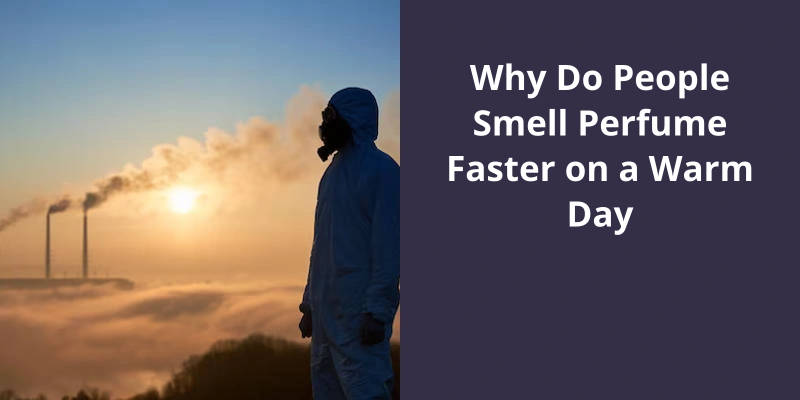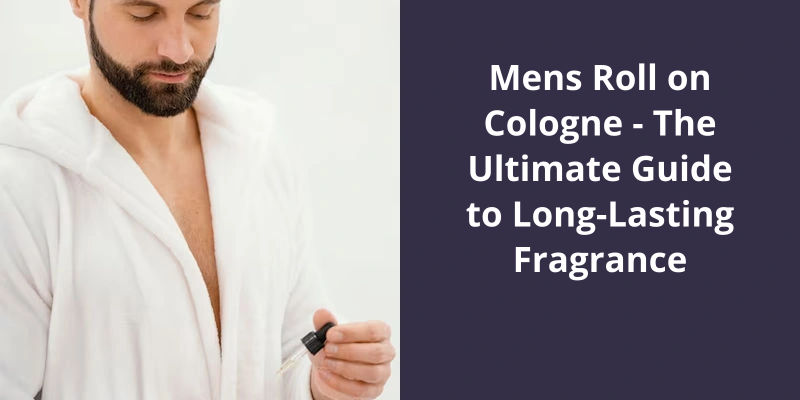Perfume is a powerful sensory experience that’s the ability to transport us to different places and evoke a range of emotions. However, have you ever noticed that the same fragrance can smell different depending on the weather? Specifically, why do people tend to smell perfume faster on a warm day? When the weather is hot, the fragrance notes in perfume seemingly intensify and unfold more rapidly on the skin, creating a captivating olfactory experience. This phenomenon can be attributed to the fact that increased heat causes the molecules in the perfume to heat up as well, resulting in a faster evaporation rate. As these heated molecules evaporate, they disperse into the air more quickly, allowing us to perceive the fragrance more intensely and swiftly. In contrast, colder environments slow down the evaporation rate, extending the longevity of the top and heart notes of a perfume. Consequently, the scent may not project as much during the winter months, as the molecules take longer to evaporate. So, the next time you catch a whiff of your favorite scent on a warm day, remember that it isn’t just your imagination – the heat truly has the power to heighten the aroma and captivate your senses.

Does Body Heat Affect Fragrance?
Body heat does indeed affect the way a fragrance smells on a persons skin. The human body naturally produces heat, and when a fragrance is applied to the skin, this heat helps to activate and release the aromatic molecules in the perfume. The temperature of the skin plays a significant role in the evaporation and dissipation of these molecules, which ultimately alters the way the fragrance is perceived.
On a warm day, the body heat is higher, causing the fragrance molecules to evaporate more quickly. The increased heat accelerates the rate at which the molecules dissipate from the skin, resulting in a stronger and more noticeable scent. This is why people often smell perfume faster on a warm day compared to a cooler one.
Warmer air tends to be less dense and more volatile, allowing the perfume molecules to disperse more easily. This leads to a greater projection of the fragrance, making it more noticeable to both the wearer and those around them.
Moreover, the combination of body heat and air temperature affects the fragrances longevity. Therefore, people may need to reapply their perfume more frequently on warm days to maintain it’s intensity.
Factors such as diet, hormones, and skin type can interact with the perfume molecules and create a unique scent.
As temperatures drop, our olfactory experience takes a slight detour. Cold weather directly impacts our sense of smell due to the characteristics of air density and molecular movement. When the air is cold, odor molecules move slower and become constrained, resulting in reduced olfactory accessibility compared to warmer environments. This interplay between temperature and scent perception adds another layer to our sensory encounters during winter months.
How Does Cold Weather Affect Smell?
When it comes to our sense of smell, the temperature of the air can have a significant impact. One curious phenomenon is that people often notice and smell perfume faster on a warm day compared to a cold one. The reason for this lies in the properties of warm and cold air.
Warm air isn’t as dense as cold air, meaning that the molecules within it have more room to move around. This increased spaciousness allows the scent molecules to move faster, making them more readily available for detection by our olfactory receptors. Essentially, it enhances the diffusion of these molecules through the air, making them reach our noses at a faster rate.
On the other hand, colder air is more compact and dense. In this environment, odor molecules move more slowly and have limited space to disperse. As a result, smells become less available to our senses, requiring more time and effort for our noses to detect them.
Source: Do you smell that? Winter is coming – Click Orlando
The holiday season is here, and with it comes chilly weather and cozy nights by the fireplace. As you reach for your favorite winter jackets and scarves, you may be wondering if your beloved perfumes will have the same staying power in the colder months. Contrary to popular belief, perfumes actually tend to last longer in winter due to the slower evaporation rate. This means that the top and heart notes of your fragrance will linger on your skin for a longer period of time, creating a more subtle and long-lasting scent experience. However, it’s not just about the longevity – certain fragrances can evoke nostalgic feelings and transport you to winter wonderlands, adding an extra layer of enchantment to your winter season.
Do Perfumes Last Longer in Winter?
In the world of perfumes, winter brings about a unique experience. As the temperature drops, the chemistry of fragrances changes, leading to different olfactory perceptions. The question arises: do perfumes last longer in winter? The answer lies in the science behind fragrance evaporation rates.
However, it isn’t only about the longevity of the fragrance on your skin. Winter scents have a way of evoking a specific feeling that perfectly complements the cozy atmosphere of the season. The warm and comforting notes found in many winter fragrances create a sense of serenity and nostalgia. These rich and opulent aromas envelop you like a warm cashmere sweater, making them perfect companions for chilly days.
While cold weather may extend the longevity of perfumes, it can also affect their projection. The concentration of the fragrance may not project as strongly, and you may find that you need to apply a slightly heavier hand to achieve the desired effect. This adjustment takes into account the density of the air, which can dampen the diffusion of scent.
Tips for Wearing Perfume in Winter: This Topic Could Provide Practical Advice on How to Make Your Perfume Last Longer and Project Better in Cold Weather, Such as Layering Scents, Using Fragrance Boosters, or Applying Perfume to Specific Pulse Points.
- Layer your scents by applying a scented body lotion or oil before spraying your perfume
- Choose a heavier, more concentrated perfume for colder weather
- Apply perfume to your pulse points, such as wrists, neck, and behind the ears
- Consider using fragrance boosters, such as scented hair mists or cloth sprays
- Avoid rubbing your wrists together after applying perfume, as it can dull the scent
- Clothing can hold fragrances longer, so spray perfume on your clothes if desired
- Store your perfumes in a cool, dark place to maintain their quality
- Avoid spraying perfume directly onto dry skin, as it can make the scent fade quicker
- Apply perfume before getting dressed to avoid any potential staining or discoloration
In addition to humidity, the amount of time fragrances are exposed to the air is also crucial in determining their effectiveness. Fragrances that have longer dwell times, or stay in the air for a longer period, are more likely to overcome the challenges posed by high humidity and maintain their intensity and perceptibility. Understanding the interplay between humidity and dwell time can help individuals make informed choices when it comes to selecting and using fragrances in different environments.
How Does Humidity Affect Fragrance?
When the air is warm and humid, the molecules of fragrance are more likely to mix and spread less. This is due to the fact that high humidity levels saturate the air with water vapor, which can interfere with the dispersion of odor molecules.
On a warm day, the heat can also increase the volatility of fragrance molecules. As the temperature rises, the molecules become more active and tend to evaporate more quickly. This can make the scent more noticeable and easier to detect, even in humid environments.
Additionally, the concept of dwell time comes into play. Dwell time refers to how long a fragrance lingers in the air before dissipating. The water vapor in the air can slow down the process of evaporation, causing fragrances to stay in the air for a longer period of time. This extended dwell time can enhance the perception of the fragrance, making it easier to smell on a warm day.
Furthermore, humidity can also affect the way our olfactory receptors function. The olfactory receptors are responsible for detecting and interpreting odors. In high humidity conditions, the moisture in the air can affect the sensitivity and functionality of these receptors, making it more challenging to smell fragrances.
This can make fragrances appear more intense and perceptible.
The Effect of Humidity on Different Types of Fragrance Ingredients (e.g. Citrus, Floral, Woody)
Fragrances are a combination of various ingredients, each with it’s own unique properties. One such property is volatility, which determines how easily a fragrance evaporates and disperses into the air.
Humidity, or the amount of moisture in the air, can have an impact on the evaporation rate of fragrance ingredients. On a warm day, when the humidity is high, the air is already saturated with moisture. This makes it more difficult for fragrance ingredients to evaporate quickly.
Citrus-based fragrances, which contain volatile compounds, may seem to be detected faster on warm days because they’re more affected by humidity. The higher moisture content slows down the rate of evaporation, allowing the citrus scent to linger in the air longer.
On the other hand, floral and woody fragrances may not be as affected by humidity due to their different chemical compositions. These fragrances typically contain more complex and heavier molecules that evaporate at a slower rate, resulting in a more consistent scent regardless of the humidity level.
In conclusion, the effect of humidity on different types of fragrance ingredients can influence how quickly we perceive certain scents. Citrus-based fragrances may be more noticeable on warm, humid days, while other fragrance types may not be as significantly impacted.
Conclusion
Understanding these factors can help individuals choose the appropriate fragrance for different weather conditions and enhance their olfactory experiences.





